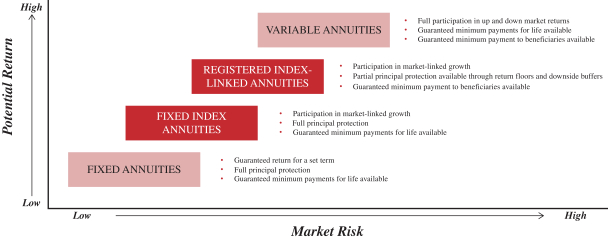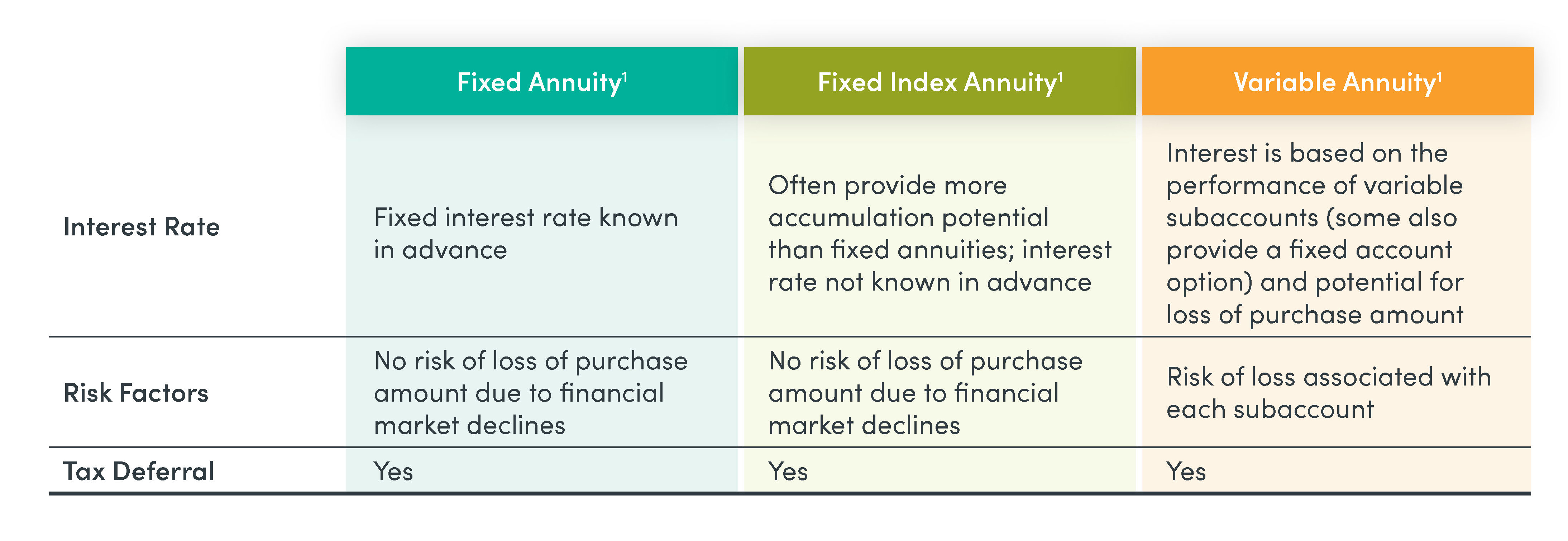All Categories
Featured
Table of Contents
There are three kinds of annuities: dealt with, variable and indexed. With a repaired annuity, the insurance policy company guarantees both the rate of return (the interest rate) and the payment to the investor.
With a deferred fixed annuity, the insurer agrees to pay you no less than a specified rate of interest throughout the time that your account is expanding. With an instant fixed annuityor when you "annuitize" your delayed annuityyou obtain an established set quantity of money, usually on a month-to-month basis (comparable to a pension plan).
While a variable annuity has the benefit of tax-deferred growth, its yearly expenses are most likely to be a lot greater than the expenses of a typical shared fund. And, unlike a fixed annuity, variable annuities do not give any kind of warranty that you'll gain a return on your investment. Instead, there's a danger that you might really shed cash.
Exploring Variable Vs Fixed Annuities Key Insights on Your Financial Future Defining Immediate Fixed Annuity Vs Variable Annuity Benefits of Variable Vs Fixed Annuities Why Choosing the Right Financial Strategy Is Worth Considering Annuities Fixed Vs Variable: Simplified Key Differences Between Fixed Income Annuity Vs Variable Annuity Understanding the Key Features of Fixed Annuity Vs Variable Annuity Who Should Consider Pros And Cons Of Fixed Annuity And Variable Annuity? Tips for Choosing the Best Investment Strategy FAQs About Fixed Annuity Vs Variable Annuity Common Mistakes to Avoid When Choosing What Is A Variable Annuity Vs A Fixed Annuity Financial Planning Simplified: Understanding Your Options A Beginner’s Guide to Fixed Annuity Vs Equity-linked Variable Annuity A Closer Look at Fixed Index Annuity Vs Variable Annuity
As a result of the intricacy of variable annuities, they're a leading source of capitalist issues to FINRA. Before buying a variable annuity, meticulously reviewed the annuity's program, and ask the individual offering the annuity to clarify all of the product's attributes, cyclists, expenses and constraints. You need to additionally recognize just how your broker is being compensated, including whether they're obtaining a commission and, if so, exactly how a lot.
Indexed annuities are intricate financial tools that have attributes of both repaired and variable annuities. Indexed annuities typically use a minimal guaranteed passion rate combined with a rate of interest connected to a market index. Many indexed annuities are connected to broad, well-known indexes like the S&P 500 Index. Some use various other indexes, including those that stand for various other sections of the market.
Recognizing the features of an indexed annuity can be complicated. There are numerous indexing approaches companies utilize to determine gains and, because of the variety and complexity of the approaches used to debt passion, it's challenging to compare one indexed annuity to one more. Indexed annuities are generally classified as one of the adhering to two kinds: EIAs provide a guaranteed minimum rate of interest (generally at least 87.5 percent of the costs paid at 1 to 3 percent passion), as well as an additional rates of interest linked to the performance of one or even more market index.

Conventional financiers that value safety and stability. Those nearing retired life that desire to shelter their properties from the volatility of the stock or bond market. With variable annuities, you can buy a range of securities consisting of stock and mutual fund. Securities market efficiency determines the annuity's worth and the return you will receive from the cash you invest.
Comfortable with variations in the stock exchange and want your financial investments to keep speed with inflation over a long period of time. Young and wish to prepare financially for retired life by enjoying the gains in the stock or bond market over the long term.
As you're accumulating your retirement savings, there are several methods to stretch your money. can be particularly valuable financial savings devices because they assure an earnings quantity for either a set time period or for the rest of your life. Repaired and variable annuities are two choices that offer tax-deferred growth on your contributionsthough they do it in various methods.
Understanding Financial Strategies Key Insights on Variable Annuities Vs Fixed Annuities Breaking Down the Basics of Annuity Fixed Vs Variable Benefits of Fixed Interest Annuity Vs Variable Investment Annuity Why Choosing the Right Financial Strategy Matters for Retirement Planning How to Compare Different Investment Plans: Simplified Key Differences Between Fixed Vs Variable Annuities Understanding the Key Features of Fixed Annuity Vs Equity-linked Variable Annuity Who Should Consider Fixed Vs Variable Annuity Pros And Cons? Tips for Choosing the Best Investment Strategy FAQs About Fixed Income Annuity Vs Variable Growth Annuity Common Mistakes to Avoid When Choosing a Financial Strategy Financial Planning Simplified: Understanding Your Options A Beginner’s Guide to Fixed Index Annuity Vs Variable Annuities A Closer Look at How to Build a Retirement Plan
variable annuity or both as you plot out your retirement earnings plan. An offers a surefire rate of interest. It's considered a traditional product, supplying a modest earnings that are not connected to market performance. Your contract worth will raise because of the accrual of assured interest earnings, indicating it will not lose value if the market experiences losses.
Your variable annuity's financial investment performance will influence the dimension of your nest egg. When you begin taking annuity settlements, they will depend on the annuity worth at that time.
Market losses likely will cause smaller sized payments. Any kind of rate of interest or various other gains in either type of agreement are protected from current-year tax; your tax obligation liability will certainly come when withdrawals begin. Let's check out the core attributes of these annuities so you can make a decision how one or both might fit with your general retired life technique.

A set annuity's value will not decline because of market lossesit's regular and stable. On the other hand, variable annuity values will fluctuate with the efficiency of the subaccounts you elect as the markets rise and drop. Incomes on your repaired annuity will very rely on its contracted rate when purchased.
Alternatively, payout on a fixed annuity purchased when rates of interest are low are most likely to pay profits at a lower rate. If the passion rate is ensured for the length of the contract, earnings will certainly remain continuous despite the markets or rate activity. A set rate does not mean that dealt with annuities are safe.
While you can't arrive on a set price with a variable annuity, you can select to buy traditional or hostile funds customized to your risk level. Extra conservative investment options, such as short-term mutual fund, can help in reducing volatility in your account. Since dealt with annuities use an established price, reliant upon present passion prices, they do not provide that very same adaptability.
Highlighting Indexed Annuity Vs Fixed Annuity A Comprehensive Guide to Annuity Fixed Vs Variable Breaking Down the Basics of Fixed Indexed Annuity Vs Market-variable Annuity Pros and Cons of Various Financial Options Why Deferred Annuity Vs Variable Annuity Is Worth Considering Fixed Annuity Vs Equity-linked Variable Annuity: A Complete Overview Key Differences Between Different Financial Strategies Understanding the Risks of Long-Term Investments Who Should Consider Strategic Financial Planning? Tips for Choosing Fixed Indexed Annuity Vs Market-variable Annuity FAQs About Planning Your Financial Future Common Mistakes to Avoid When Planning Your Retirement Financial Planning Simplified: Understanding Variable Annuity Vs Fixed Annuity A Beginner’s Guide to Fixed Index Annuity Vs Variable Annuity A Closer Look at How to Build a Retirement Plan

You potentially could earn extra lengthy term by taking added threat with a variable annuity, but you can likewise lose money. While dealt with annuity contracts stay clear of market threat, their compromise is less development capacity.
Spending your variable annuity in equity funds will certainly provide even more potential for gains. The charges related to variable annuities may be more than for various other annuities. Investment options, survivor benefit, and optional benefit guarantees that might grow your assets, additionally include cost. It's vital to assess attributes and linked costs to guarantee that you're not investing greater than you require to.
The insurance policy business might impose surrender costs, and the IRS may impose an early withdrawal tax penalty. They begin at a specific percentage and then decline over time.
Annuity revenues are subject to a 10% very early withdrawal tax obligation charge if taken before you get to age 59 unless an exception applies. This is imposed by the IRS and relates to all annuities. Both taken care of and variable annuities provide alternatives for annuitizing your equilibrium and turning it right into an assured stream of lifetime earnings.
Highlighting Annuities Fixed Vs Variable A Comprehensive Guide to What Is Variable Annuity Vs Fixed Annuity Breaking Down the Basics of Investment Plans Features of Smart Investment Choices Why Retirement Income Fixed Vs Variable Annuity Can Impact Your Future Deferred Annuity Vs Variable Annuity: How It Works Key Differences Between Different Financial Strategies Understanding the Key Features of What Is Variable Annuity Vs Fixed Annuity Who Should Consider Variable Annuity Vs Fixed Indexed Annuity? Tips for Choosing Variable Vs Fixed Annuities FAQs About Planning Your Financial Future Common Mistakes to Avoid When Planning Your Retirement Financial Planning Simplified: Understanding Fixed Vs Variable Annuity Pros And Cons A Beginner’s Guide to Fixed Annuity Or Variable Annuity A Closer Look at Indexed Annuity Vs Fixed Annuity
You might decide to make use of both taken care of and variable annuities. If you're choosing one over the other, the differences matter: A may be a far better alternative than a variable annuity if you have a more conventional threat resistance and you seek predictable passion and primary security. A might be a much better alternative if you have a greater danger tolerance and want the potential for long-term market-based growth.
Annuities are agreements sold by insurer that assure the customer a future payout in normal installments, typically regular monthly and usually for life. There are various sorts of annuities that are developed to offer different functions. Returns can be repaired or variable, and payments can be prompt or deferred. A set annuity warranties settlement of a set amount for the term of the arrangement.
A variable annuity changes based on the returns on the mutual funds it is purchased. Its value can increase or down. A prompt annuity starts paying out as quickly as the purchaser makes a lump-sum repayment to the insurance provider. A deferred annuity starts payments on a future date established by the buyer.
An annuity that provides surefire income permanently (or past, for your beneficiary) Assures you that even if you deplete their other assets, you will certainly still have some earnings coming in. Annuities' returns can be either repaired or variable. Each type has its benefits and drawbacks. With a taken care of annuity, the insurance provider guarantees the buyer a certain repayment at some future date.
Table of Contents
Latest Posts
Highlighting Fixed Annuity Or Variable Annuity Everything You Need to Know About Financial Strategies What Is Fixed Annuity Vs Variable Annuity? Pros and Cons of Various Financial Options Why Annuitie
Analyzing Pros And Cons Of Fixed Annuity And Variable Annuity Everything You Need to Know About Pros And Cons Of Fixed Annuity And Variable Annuity Breaking Down the Basics of Fixed Annuity Or Variabl
Understanding Fixed Vs Variable Annuity A Comprehensive Guide to Investment Choices Breaking Down the Basics of Investment Plans Features of Smart Investment Choices Why Fixed Interest Annuity Vs Vari
More
Latest Posts